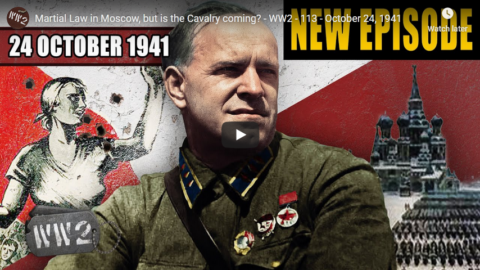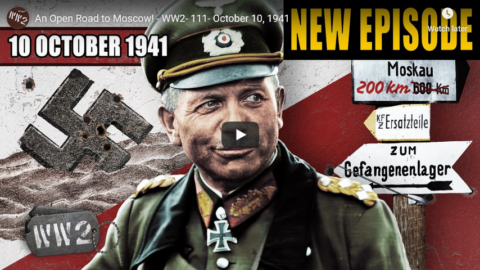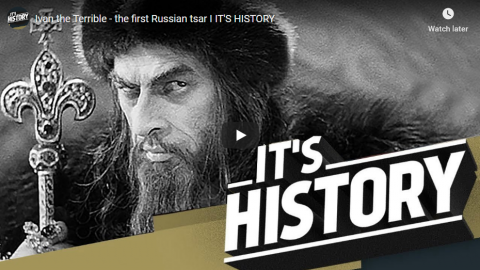World War Two
Published 24 Oct 2020The Germans draw ever closer to Moscow, but Soviet reinforcements have begun to arrive from Siberia and the city’s defenses have grown stronger. Meanwhile in the south, the Germans are sweeping into the Crimea and looking hungrily at the Caucasus.
Join us on Patreon: https://www.patreon.com/TimeGhostHistory
Or join The TimeGhost Army directly at: https://timeghost.tvFollow WW2 day by day on Instagram @ww2_day_by_day – https://www.instagram.com/ww2_day_by_day
Between 2 Wars: https://www.youtube.com/playlist?list…
Source list: http://bit.ly/WW2sourcesWritten and Hosted by: Indy Neidell
Director: Astrid Deinhard
Producers: Astrid Deinhard and Spartacus Olsson
Executive Producers: Astrid Deinhard, Indy Neidell, Spartacus Olsson, Bodo Rittenauer
Creative Producer: Maria Kyhle
Post-Production Director: Wieke Kapteijns
Research by: Indy Neidell
Edited by: Miki Cackowski
Sound design: Marek Kamiński
Map animations: Eastory (https://www.youtube.com/c/eastory)Colorizations by:
Julius Jääskeläinen – https://www.facebook.com/JJcolorization/
Mikolaj Uchman
Klimbim – https://www.flickr.com/photos/2215569…
Daniel Weiss
Carlos Ortega Pereira, BlauColorizations – https://www.instagram.com/blaucolorizations
Dememorabilia – https://www.instagram.com/dememorabilia/
Norman Stewart – https://oldtimesincolor.blogspot.com/Sources:
Mil.ru
Bundesarchiv
Narodowe Archiwum Cyfrowe
Yad Vashem 90FO3
from the Noun Project: Skull by Muhamad Ulum, Horse by RIZCA, Injury by Adriano Emerick, Oil Tank by MangsaabguruSoundtracks from the Epidemic Sound:
Johannes Bornlof – “The Inspector 4”
Reynard Seidel – “Deflection”
Johannes Bornlof – “Death And Glory 3”
Johan Hynynen – “Dark Beginning”
Hakan Eriksson – “Epic Adventure Theme 4”
Gunnar Johnsen – “Not Safe Yet”
Andreas Jamsheree – “Guilty Shadows 4”Archive by Screenocean/Reuters https://www.screenocean.com.
A TimeGhost chronological documentary produced by OnLion Entertainment GmbH.
October 25, 2020
October 18, 2020
October 11, 2020
October 4, 2020
August 19, 2020
January 4, 2020
Ivan the Terrible – the first Russian tsar I IT’S HISTORY
IT’S HISTORY
Published 14 Feb 2018Ivan IV Vasilyevich commonly known as Ivan the Terrible was the first tsar of Russia. Did he deserve his title?
April 27, 2019
QotD: When McDonald’s came to Moscow
[In an NPR broadcast] McDonald’s is positively portrayed as being an excellent, almost heroic, force for good. McDonald’s manner of doing business is celebrated as changing social norms for the better – for making the world (or at least Russia) not only a more consumer-friendly place, but also a more pleasant, a more polite, a more respectful, and a (yes) more happy place.
Listeners are reminded at the start of the clip that Americans smile a lot, including at strangers. Russians – and, especially, Russians under Soviet domination – did not smile very much. Then McDonald’s opened in Moscow in 1990. McDonald’s trains its workers to smile at customers, and to be polite and friendly. We then learn – from one of the Russians who worked at that McDonald’s in Moscow – that that restaurant became a place of pleasant refuge for Muscovites. The simple, smiling friendliness and politeness that Americans take for granted was, in Russia, actively sought after by many Russians and embraced by their choosing to dine at McDonald’s.
Commerce – voluntary exchange – is essential for what Deirdre McCloskey calls “market-tested betterment.” This betterment, however – and Deirdre would agree – is manifested not only in new and better material products but also in the ways in which businesses treat consumers. In market economies consumers are valuable to businesses; in these economies consumers are treated by businesses as respected guests. In contrast, in non-market economies – in economies in which prices and profits are prevented from moving in market-clearing directions – consumers are treated by ‘businesses’ as repellant pests.
Don Boudreaux, “Doux Commerce, avec Sourires“, Café Hayek, 2016-06-17.
September 1, 2017
The Moscow State Conference – Black Sea Revolutionaries I THE GREAT WAR Week 162
Published on 31 Aug 2017
The political factions that oppose the rise of Bolshevism in post-revolutionary Russia come together for a conference this week 100 years ago. But apart from the Moscow State Conference, some people in the military actually aim for a military dictatorship to restore order in Russia and continue the war. At the same time the 2nd Battle of Verdun comes to an end with a French victory and revolutionary fever also spreads across the Black Sea Fleet.
January 18, 2016
The craft beer movement infiltrates the land of vodka
In The Guardian, Alec Luhn reports on the rise of craft brewing in the heart of vodka-swilling Russia:
It is a drizzly Monday night, but Craft rePUBlic is boisterous with the chatter of brewers and beer aficionados. Those just walking in are greeted with a half pint of Red Nelson, a saison beer made with hibiscus tea and orange peel by local brewer Alexei Sazonov, who is celebrating his birthday at the craft beer bar.
Sazonov works at Bottle Share, one of a growing number of microbreweries driving what has been dubbed the “craft revolution” here, but he created Red Nelson at home under his nickname, Big Hedgehog. Sazonov says of the major Russian beer brands, whose bland lagers dominate store shelves and taps: “They boil it quickly, ferment it quickly and sell it quickly. A microbrewer brews beer he wants to drink himself.”
Russia, of course, is known for vodka rather than beer, and a popular saying holds that “beer without vodka is throwing money to the wind”. According to the latest World Health Organisation data from 2010, 51% of alcohol consumed in Russia was spirits and only 38% was beer. This vodka culture has had deadly consequences for Russian men, whose average life expectancy of just 64 years lags behind that in European countries due mainly to heavy drinking and tobacco use.
Now a new generation of “beer geeks”, as they dub themselves, is working to change Russians’ approach to beer – and to drinking in general. With a focus on savouring the taste rather than drinking to get drunk, at least two dozen craft bars have opened in Moscow since the summer of 2014, serving Russian and foreign microbrews. They’re getting so numerous that the cultural magazine Afisha declared in August that it was “refusing to write reviews of the craft beer bars that are opening every week”.
Few expect beer to displace vodka as the national drink, especially after the government reduced the minimum price of the spirit in 2015 amid economic troubles. But there’s a long tradition of homebrewing in Russia, and the growth potential of craft beer is huge thanks to its relative affordablity; local craft brews typically sell for between 200 and 300 roubles (£2-3) a pint. Moreover, it’s easy to start a craft bar: no liquor licence is required if an establishment serves only beer, and startup costs are minimal, since a large staff, kitchen and lavish interiors aren’t typically necessary. As a result, craft bars are spreading from Moscow and St Petersburg to the regions.









